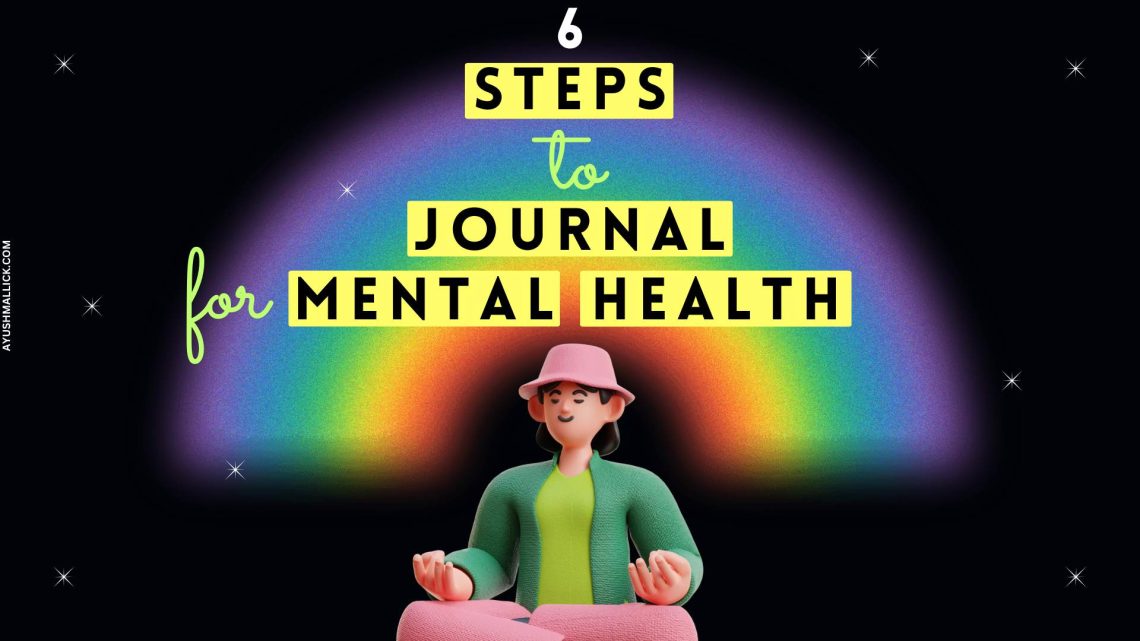
6 Steps To Journal For Mental Health
Life becomes tough when we suffer from anxiety, sadness, depression, etc. While many people think that these mental health issues are a part of life, I strongly feel that journal for mental health is a great way to permanently cure these issues.
Hence, I have tried my best to state these 6 easy journaling tips to permanently cure mental health.
Ready? Let’s Go…
Before You Begin
Before you begin, please keep these things in mind. It’s nothing but to make your journaling smooth and obstacle-free.
(1) Choose a Quiet Place
Choosing a quiet place before you start writing your journal is essential. Why? So that nobody interrupts you while you’re in the process of reliving your painful emotions.
But, if you have private time for yourself, write your therapy journal before going to bed. Journaling before bed is a great habit you can adopt for great results.
Hence, this is the first arrangement you must make before diving in.
(2) Establish a Routine
Now that you have decided on a dedicated place for journaling, it’s time to set a routine.
Setting a fixed routine to do a daily task may not seem essential, but it’s important to follow a daily pattern. You’ll not observe any changes initially, but with time, after your subconscious mind is trained to write a daily journal, it’ll automatically remind you.
Having a daily routine makes any task frictionless.
(3) Make a Separate Journal
Use or buy a new diary. This unique diary will only used for writing your daily feelings. This diary will be the witness to all your darkest thoughts and feelings that are bugging you.
You can journal randomly anywhere, but later, you won’t know whether you have progressed.
So, please buy a new diary and keep it a secret from everyone. The more secretive you’re, the better it is for you.
(4) Set a Goal
Now, this is an important one. You need to set a goal to cure yourself. You might have many mental issues you want to get rid of, and you want to get rid of them as quick as possible.
But this is where most make mistakes. You might experience a mental breakdown if you release too many emotions at once. Hence, it’s safe to do it one step at a time.
Initially, focus on minor issues and move on to the hard, harsher problems after they are solved. Take care of the little problems initially. Eventually, you’ll see that even the major problems won’t disturb you too much.
(1) Be Free To Write Anything You Want
I can complete this section with just two words: “Write Freely.”
This suggestion may seem the simplest and rudimentary, but there’s a high chance you’ll have difficulty writing freely.
We all have a terrible habit of focusing too much on our writing style. We constantly focus on whether we are grammatically correct.
Shed all those limitations and ONLY focus on writing whatever comes to your mind. It doesn’t matter how bad your handwriting is or how many errors you make while writing. What only matters is whether you’re true to yourself? If not, then you won’t benefit much from journaling.
(2) Identify Any Repetition
After you’ve accumulated a few weeks of journaling, it’s time to look back at everything you’ve written. Do you see any repeating pattern?
If you find any repeating pattern, that’s where your mental problems lie. The brain is ruthless about what you think and keeps repeating something that makes you weak.
Now you see why I requested that you make a separate journal. If you scatter your daily journal too much, later, you won’t find any pattern and understand whether you have progressed.
Now you know why keeping a separate journal is an excellent idea to track your progress. If you write everything in one place, seeing any patterns or improvements over time will be more challenging.
(3) Let Your Emotions Flow
Letting your emotions flow is the key to solving all your issues. And believe me, if you allow all those emotions to flow, you’ll feel light because all those negative and depressed emotions have exited.
And I strongly request you to not stop yourself from crying or expressing other emotions. Let it all out.
Many people stop crying when they journal because crying is a cringe. No! Whoever says this doesn’t seem right is making a mistake. Children are always happy because they express emotions immediately without thinking about their external environment.
(4) Use Art To Express Your Emotions
Do you love painting? How about drawing and sketching? If not, then you should try mandala art.
Lately, people are into mandala art because, for some reason, it has a healing effect on the mind. Of course, you’re open to doing anything that soothes your mind, but I personally have observed that art really does heal the heart and mind.
I don’t know whether you know this, but Walt Disney, the man behind Mickey Mouse, used to draw Mickey’s images when he was stressed.
Don’t believe it? Google it…
(5) Review Your Mind Journal
Finally, reviewing your journal every week or monthly is a great habit to see your progress. If you don’t see any progress then either you are doing something wrong, or you are already free from whatever you’re trying to free yourself from.
Don’t get discouraged if you don’t find much change, but I’m pretty sure, if you’re journaling the right way, you’re bound to see changes after some weeks, or in worst case, in months.
The deeper you observe your journal, the more you’ll discover how much you have changed.
(6) When Nothing Else Works
When nothing else work, the only option left to permanently cure your mental health is to consult a professional. There’s nothing wrong to get help when it come to cure yourself.
Professional guidance does work, and it works great, especially when you want to cure yourself.






